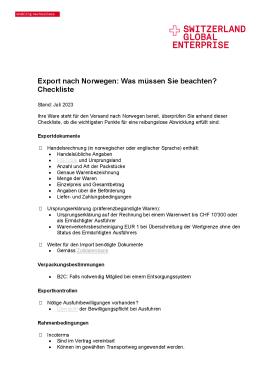Last updated: July 2023
Required export documents
- Commercial invoice (in Norwegian or English)
In addition to the standard commercial information, the invoice must include the following:
-HS code and country of origin
- Number and type of packages
- Exact description of goods
- Quantity of goods
- Unit price and total amount
- Transport details
- Terms of delivery and payment
- Declaration of origin
For goods of preferential origin in accordance with the agreements of the EFTA Convention, a declaration of origin must be drawn up on the invoice or a movement certificate EUR 1 for goods valued at CHF 10.300 or more.
Approved exporters may issue declarations of origin on the invoice for all values of goods.
Detailed information on the import formalities applicable to your products in Norway can also be found in our free customs database.
Packaging provisions
Companies that sell more than 1,000 kg of a type of packaging on the Norwegian market per year are obliged to become a member of a waste disposal system.
In general, this obligation is borne by the Norwegian importer. However, if the latter does not assume the obligations or if the deliveries are made directly to the end consumer (B2C), the foreign company is held responsible.
Sanctions/embargoes/export controls
At the time of drafting this article, no sanctions or embargoes are imposed on Norway.
Certain products and product groups, such as dual-use goods, also require an export permit for delivery to non-sanctioned countries.
Tips from S-GE
Business relationships
In terms of business culture, it is generally easy for Swiss people to do business in Norway, and many important values coincide with those of Swiss companies. The principles of the business culture correspond to the Scandinavian working values. Firstly, this means that equality in the workplace is very important, especially with regard to the sexes, and, secondly, that hierarchies tend to be flat. As a result, the management style is more informal and employees are given a relatively high degree of freedom while also taking responsibility for their tasks. Norwegian companies often work across hierarchies, which is important for foreign partners to understand.
In addition to the Norwegian language, a high level of English is also spoken. Norway maintains a broad informal culture and in business, most Norwegians address each other on a first-name basis after the first introduction.
Since the hierarchy is often quite flat and decision-making is based on consensus and compromise, decisions can take a long time. While Norwegians are generally able to express their views clearly and disagree with their boss or foreign business partner, the purpose of this is to achieve a joint consensus and find a joint solution and should be understood as such.
Meetings in Norway start on time and are often handled efficiently, with just a short period of small talk. Meetings are generally held on an informal basis and preferably without notes or minutes being taken. Promising things that cannot be kept is taboo. So don’t just be punctual, take notes on discussions – and stick to the agreed points.
Incoterms
In principle, all Incoterms clauses may be used for deliveries to Norway. When negotiating contracts, bear in mind that certain Incoterms clauses should only be used for sea transport and adapt them to the selected mode of transport.
Payment terms
Depending on the order volume or project scope, it is advisable to apply payment terms the same way as in Switzerland or other European countries. There are no statutory requirements regarding payment terms, with the usual payment term in Norway 14 days net.
All information in this article is for guidance purposes only and is not exhaustive or legally binding.




